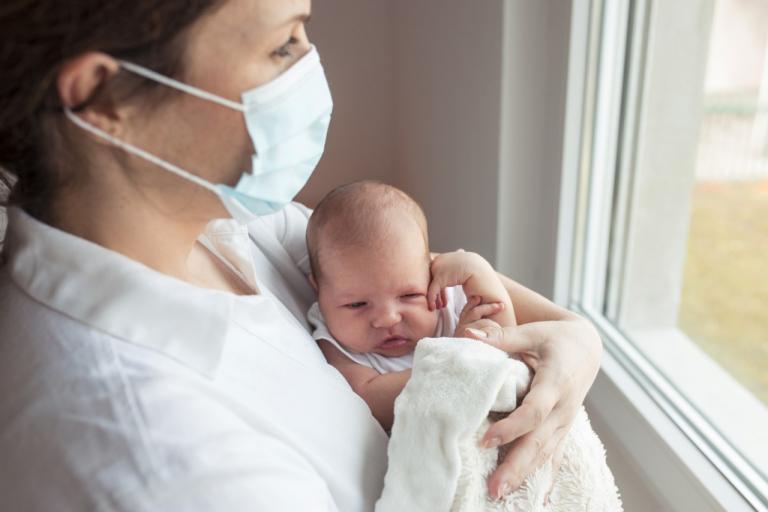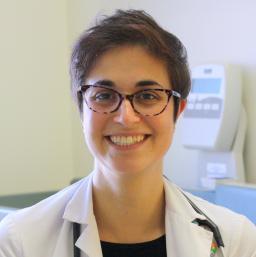Happy. Healthy. Southie.
Supportive and non-judgmental advice from SBCHC's health experts.
Newborns, Visitors and COVID-19 (and Flu and RSV): When can I hold your baby? Updated for Fall 2022
By: Jocelyn Guggenheim
In the nearly 2 decades I have spent working with new parents, I can’t remember a time when the question about who should be allowed around a newborn was so complicated.
We have always wanted to keep new babies and new parents healthy, fed, and supported (no small feat) but even as the COVID-19 pandemic becomes endemic, we are more aware than ever of the risk illness brings to small babies. RSV and Flu have joined the list of things making new parents terrified, and keeping babies protected feels nearly impossible. Everyone wants to know what is safe. And while these decisions will look slightly different for every family, I thought it would be helpful to outline some basic principles that I discuss with my primary care patients and new mothers who attend our support group to help them make a plan that works for them.
This basic decision framework is more robustly outlined in this article, written by Brown University economist Emily Oster, who has made a career of helping parents navigate complicated questions with limited scientific evidence.
First, decide what you’re deciding:
“Should we have visitors” is different than “can my mother drop off food”. Most of my families want to know when it is safe for grandparents, aunts and uncles, and friends, to hold their newborns.
Next, decide what benefits your decision could bring:
The most common one: “when can my mother hold my baby” may bring a varying amount of benefit, depending on a host of factors related to you, your mother, and your baby.
For some parents this may mean a daily nap, shower, or meal that they would not otherwise get. For others this may simply produce a 15-minute cuddle, a photograph (and likely a very happy grandparent) but then after the moment passes there will be no lasting benefit.
I have always encouraged new parents to really think about what type of help is actually helpful, now more than ever.
Around the holidays there may be emotional benefits from being close to a community of people who make you feel loved. Or a holiday gathering may be tiring or overwhelming-it depends on lots of factors.
After you decide the benefit, determine the risk (to all parties):
There is the risk to the baby, the risk to the parents and the risk to the visitor.
For babies, this depends a bit on the virus. Children are generally unaffected by COVID. Especially if mothers are vaccinated during pregnancy, the risk of COVID infection causing a severe illness in a newborn is extremely low. Flu, and especially RSV, are different. Flu is considered more likely to cause more severe symptoms (fever, cough, dehydration) in children under age 2 and over 65. RSV is even more dangerous, especially for newborns and premature infants. RSV is a common reasons for hospitalization for children under the age of 1 so, whenever possible, we want to avoid babies getting RSV.
Parents are often healthy young adults, a fact that limits the chances of severe COVID-19 infection. And, hopefully everyone age 6 months and older is fully vaccinated against COVID and Flu (especially pregnant women). There will soon be an RSV vaccine, but there are none available yet. We know vaccination significantly reduces the impact and spread and severity of these viruses. But any parent knows that caring for a child when you are even a little unwell is challenging, to say the least. We need to ensure parents are as healthy as possible so they can be there for the new family member. RSV is usually mild in adults. Flu is no fun, especially for unvaccinated adults.
The risk to grandparents will differ depending on the health status of the grandparent, but many will automatically be higher risk for complications from COVID, RSV, and Flu because of their age alone.
Finally, not every visit carries the same amount of risk. Outdoor socially distanced, where all adults wear masks and no one even a little bit sick attends, are extremely low risk. Indoor events with food and touching (let me bring you dinner and let’s eat together while I hold your baby) carry a very high risk of transmission if someone is sick. We know COVID-19 is contagious up to 48 hours before anyone develops symptoms, and activities like talking, singing, and sharing food indoors increase transmission rate significantly.
The good news is, with COVID-19 there are ways to reduce this risk further. Everyone taking a rapid test before coming over is a great way to slash the chance of spread. For Flu, RSV, and other viruses we always recommend anyone who feels even a bit sick or has a sick household member stays away until everyone is better. That same adult could also wear a high quality well fitted mask. Masks, when they were commonly used, essentially eliminated Flu and RSV in the 2020-2021 and 2021-2022 cold and flu seasons.
The underlying challenge of all these conversations is the pressure new parents feel to say yes when people outside the immediate family ask to be brought in. It has always been the crux of this conversation. Frankly, if a parent knows they need help to survive (see the example of a grandparent who is trusted and readily available to provide a meal, a clean house, and a desired break), they usually don’t ask me if that is acceptable. They have already decided that they need it and any reasonable risk is worth it.
These situations are particularly difficult when the new parents see the people who are asking offer a less clear benefit. The struggle to say no to these requests seems like a rejection. Why is it hard for new parents to say no?
They feel guilty about saying no to someone they love
They feel sad that they don’t feel the interaction would be worth the risk
They know their already heightened anxiety would be brought to an unbearable level after the potential exposure
They worry about damaging the relationship and all the short and long-term consequences of this
I could go on and on
We know that the rate of postpartum anxiety is as high as 1 in 4 for women and 1 in 10 for men.
So, if you’re a new parent who is not sure what to do, reach out to medical professionals, counselors, or friends who can help you can think straight when you’re tired, and worried, and overwhelmed. Also, know you are not alone, these are universal issues for new parents, especially during the winter months.
If you’re asking to visit and are told to wait, please respect that this decision didn’t come easily and saying no is as challenging as saying yes.
And if you’re thinking about asking to visit a new family, I would advise you just not to ask. They will tell you when they are ready for you. Food dropped on the doorstep with a text that you already left is the nicest gift for parents who haven’t asked you for more.
For more supportive advice from SBCHC’s health experts, visit our Happy. Healthy. Southie. blog.

